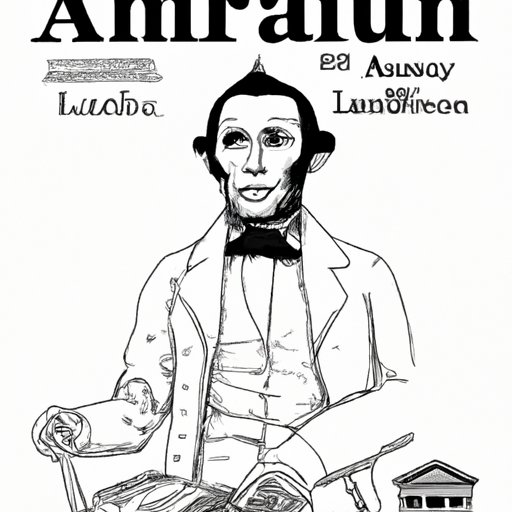
Introduction
The issue of Abraham Lincoln’s role in ending slavery in America is a complex and highly debated one. While many believe that he was instrumental in the abolition of slavery, others argue that his actions were driven more by political considerations than by a deep commitment to civil rights. This article examines the evidence on both sides and attempts to provide a definitive answer to the question: did Abraham Lincoln free the slaves?
The Path to Emancipation: A Look at Abraham Lincoln’s Role in Freeing the Slaves
Abraham Lincoln’s early political career was characterized by a growing opposition to slavery. He believed that it was a moral wrong that was antithetical to American values, and he called for an end to it at every opportunity. When Lincoln became president in 1861, he made it clear that he would do everything in his power to bring an end to slavery in America.
The path to emancipation was a long and difficult one, and it was marked by a series of events that eventually led to the Emancipation Proclamation. These events included the Civil War, Lincoln’s discussions with abolitionist leaders, and the changing attitudes of the American public towards slavery. Ultimately, however, it was Lincoln’s leadership during the Civil War and his unwavering commitment to ending slavery that were the most critical factors in bringing about abolition.
Debunking Myths: The Truth Behind Abraham Lincoln and the Emancipation Proclamation
There are many myths and misconceptions about Lincoln’s role in ending slavery, particularly with regard to the Emancipation Proclamation. One common misconception is that the Emancipation Proclamation freed all slaves in the United States. In fact, the Proclamation only applied to those slaves who lived in states that were in rebellion against the Union, and it did not apply to slaves who lived in states that were loyal to the Union. Nonetheless, the Proclamation was a major step towards ending slavery, as it signaled Lincoln’s commitment to the cause and helped to shift public opinion in favor of abolition.
Examining the Motivations Behind Lincoln’s Decision to Free the Slaves
Lincoln’s decision to issue the Emancipation Proclamation was motivated by a variety of factors. On a moral level, he believed that slavery was a profound injustice that needed to be eradicated. On a political level, he knew that ending slavery would help to weaken the Confederacy and bring the war to an end. Additionally, Lincoln was under pressure from abolitionist leaders and the American public to take a stand on slavery. Ultimately, it was a combination of these factors that led to his decision to issue the Proclamation.
From Gettysburg to Emancipation: Lincoln’s Role in Ending Slavery
The road to emancipation was a long and difficult one, and it was marked by a series of significant events, both military and political. These events included the Battle of Gettysburg, which was a turning point in the war, and the passing of the 13th Amendment, which formally abolished slavery in the United States. Throughout these events, Lincoln provided critical leadership and guidance, serving as a unifying force for the Union and a tireless advocate for the end of slavery.
The Emancipation Proclamation: A Turning Point in American History
The Emancipation Proclamation was a turning point in American history, marking a critical shift in public opinion about slavery and helping to bring an end to the Civil War. While it did not technically free all slaves in the United States, it nonetheless paved the way for a broader commitment to civil rights and marked an important first step towards ending slavery for good. In the years that followed, the Proclamation continued to be celebrated as a major milestone in the fight for freedom and equality for all.
Abraham Lincoln’s Legacy: Examining His Impact on the Abolition of Slavery
Abraham Lincoln’s legacy as a champion of freedom and equality is an enduring one. His unwavering commitment to ending slavery helped to shift public opinion in favor of abolition and provided critical leadership during a time of great unrest and uncertainty in American history. His actions paved the way for the eventual passing of the 13th Amendment and set a precedent for leadership on civil rights issues that continues to be celebrated and emulated today.
Fighting for Freedom: The Political Battles That Led to Lincoln’s Emancipation Proclamation
The fight for freedom and equality was not an easy one. There were many political battles that had to be fought and many challenges that had to be overcome in order to achieve abolition. Lincoln’s political strategy and leadership were critical in these battles, as he worked to build public support for his policies and to rally his supporters in the fight against slavery. Ultimately, his tireless efforts paid off, as he was able to help bring about an end to slavery in the United States and set in motion a new era of progress and opportunity for all Americans.
Conclusion
In conclusion, Abraham Lincoln played a critical role in ending slavery in America. Although it was a long and difficult path, his unwavering commitment to the cause and his leadership during the Civil War provided the critical support needed to bring about abolition. The Emancipation Proclamation and the eventual passage of the 13th Amendment were important milestones in this struggle, marking an important step towards equality and justice for all. Today, Lincoln’s legacy continues to inspire and guide us in the ongoing fight for civil rights and equal opportunity for all Americans.





